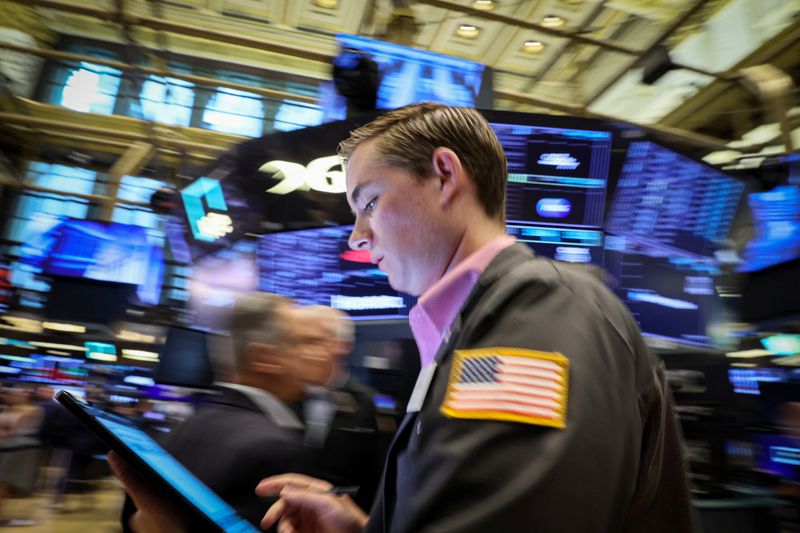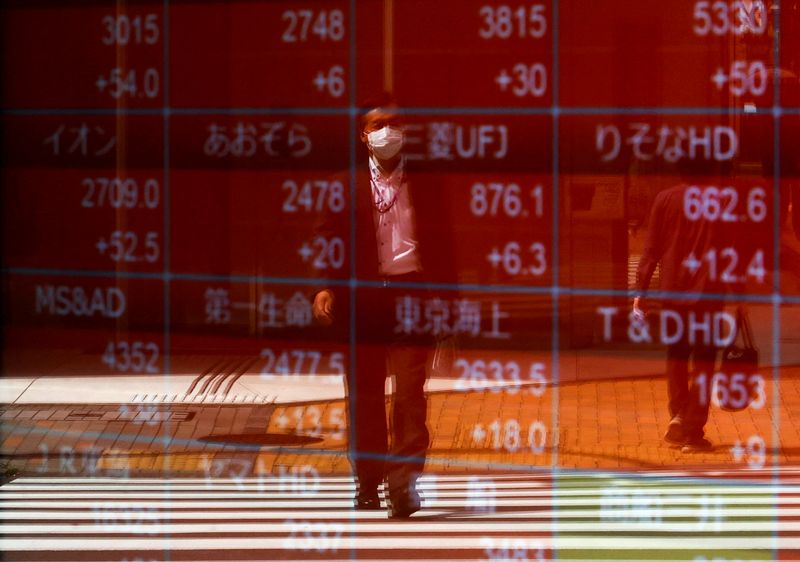By Sinéad Carew and Marc Jones
NEW YORK/LONDON (Reuters) - MSCI's global index of stocks fell on Thursday while Treasury yields rose as a surge in U.S. private payrolls prompted concerns that interest rates would stay higher for longer.
Payroll company ADP (NASDAQ:ADP) said June private payrolls rose 497,000, far exceeding economists' expectations for a 228,000 increase and 267,000 in May. The Labor Department said initial claims for state unemployment benefits rose 12,000 to a seasonally adjusted 248,000 for the week ended July 1, but the prior week was revised to show 3,000 fewer applications than reported.
Compounding worries that this would lead to a more hawkish central bank, Federal Reserve Bank of Dallas President Lorie Logan said on Thursday that a continued above-target inflation outlook and a stronger-than-expected labor market "calls for more-restrictive monetary policy."
U.S. Treasury yields climbed after the labor market data boosted expectations for aggressive Fed rate hikes to rein in stubbornly high inflation. The U.S. dollar had pared losses against other major currencies after the report while stock indexes were in the red across the board.
"There's just a lot of uncertainty right now in terms of how strong the economy is and what the Fed might have to do to try to deal with inflation pressures," said James Ragan, director of wealth management research at D.A. Davidson.
While ADP's data is not always aligned with the government's monthly jobs data, due out on Friday, the private payrolls data was so much higher than expected it raised concerns that Friday's report would also surprise to the upside, Ragan said.
"Given we'd such a strong end of June the market is, at least for today, taking a more conservative view," he said.
The Dow Jones Industrial Average fell 366.38 points, or 1.07%, to 33,922.26, the S&P 500 lost 35.23 points, or 0.79%, to 4,411.59 and the Nasdaq Composite dropped 112.61 points, or 0.82%, to 13,679.04.
The S&P 500 posted its biggest daily percentage drop since May 23. The Dow logged its biggest single-day fall since May 2.
MSCI's all country world price index pared losses to 1.25% for its biggest one day percentage drop since April 25. Earlier, it had fallen as much as 1.7%.
"All of it paints a picture of a market that's concerned about the economy and a Fed that is still dead set on tightening monetary policy," said Alex Coffey, senior trading strategist at TD Ameritrade.
With "no signs of deterioration in the labor market," Coffey said that increasingly tight monetary policy will "all but assuredly cause some sort of economic slowdown."
Money market traders now see an 92.4% chance of a quarter-point hike at the bank's July 26 meeting and traders were betting on a 25.9% chance of another hike in September, compared with 18.1% on Wednesday, CME Group's (NASDAQ:CME) FedWatch tool showed.
And D.A. Davidson's Ragan noted that futures indicate few bets on rate cuts until June of 2024 compared to recent bets on many as two rate cuts later in 2023.
In Treasuries 2-year Treasury yields rose above 5% for the first time since early March and touched their highest levels since June 2007. [GVD/EUR][US/]
Benchmark 10-year notes were up 8.8 basis points to 4.033%, from 3.945% late on Wednesday. The 30-year bond was last up 5.3 basis points to yield 3.9969%. The 2-year note was last was up 4 basis points to yield 4.9912%, after earlier rising as high as 5.12%.
In currencies, the dollar index fell 0.203%, with the euro up 0.32% to $1.0886. The Japanese yen strengthened 0.38% versus the greenback at 144.11 per dollar, while sterling was last trading at $1.2737, up 0.26% on the day.

In energy markets, oil prices were little changed as the market digested the higher likelihood of a U.S. interest rate hike that could dent energy demand.
U.S. crude settled up 1 cent at $71.80 per barrel and Brent finished at $76.52, down 0.17% or 13 cents.
